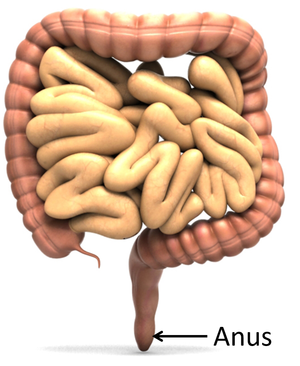Difference between revisions of "Anus"
(→About the Anus) |
|||
| Line 15: | Line 15: | ||
: When the [[muscle]]s of the [[anus]] relax then [[faeces]] can be released. | : When the [[muscle]]s of the [[anus]] relax then [[faeces]] can be released. | ||
: When the [[muscle]]s of the [[anus]] [[contract]] it holds the [[faeces]] in. | : When the [[muscle]]s of the [[anus]] [[contract]] it holds the [[faeces]] in. | ||
| − | : If the [[faeces]] does not come out when you relax then you have constipation and need to eat more [[fibre]]. | + | : If the [[faeces]] does not come out when you relax then you have [[constipation]] and need to eat more [[fibre]]. |
==Key Stage 4== | ==Key Stage 4== | ||
Revision as of 19:37, 19 April 2019
Contents
Key Stage 2
Meaning
The anus is part of the digestive system that poo comes out of.
About the Anus
- The muscles in the anus need to relax to let out the poo. You should not try to 'push' the poo out or it can cause piles.
Key Stage 3
Meaning
The anus is a ring of muscle at the end of the digestive system that holds tight until faeces is ready to be released.
About The Anus
- The anus is found at the end of the rectum.
- When the muscles of the anus relax then faeces can be released.
- When the muscles of the anus contract it holds the faeces in.
- If the faeces does not come out when you relax then you have constipation and need to eat more fibre.
Key Stage 4
Meaning
The anus is a sphincter at the end of the digestive system that holds tight until faeces is ready to be egested.
